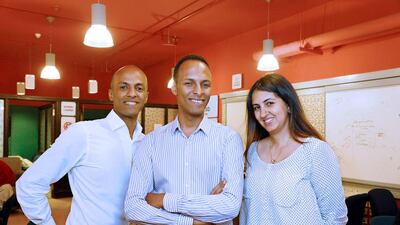For Hazem Saleh, the idea to start an online funding portal for non-governmental organisations (NGOs) grew out of his eight years of experience working in the field. While NGOs run projects in Egypt that strive to improve basic living standards, there is little awareness of these initiatives among the general population.
“The challenge is getting exposure to the audience and getting known to the masses in the region, especially in Egypt, about the development work happening and how we can get the support of the people and finance the projects,” says Mr Saleh, who used to work as a project coordinator at non-profit Ashoka.
So the 29-year-old from Cairo and five other co-founders from the capital city launched Madad, which means “to support” in Arabic, in July this year. The platform allows donors to not only send their funding directly to specific projects but also to track the execution of their donation. Madad hopes to redirect funds from short-term charity to sustainable development causes and raise the level of transparency and accountability in the philanthropic sector, according to the co-founders.
Madad, incubated at the American University of Cairo’s Venture Lab (V-Lab), is among a growing number of start-ups in Egypt. The start-up scene has become more active since the 2011 revolution, Mr Saleh says, but the lack of a funding ecosystem is still hurting young enterprises.
“The revolution gave people the confidence to take risk and start a business,” says Sherif Shabana, the V-Lab manager at AUC. “The struggling economy has also impacted the numbers of jobs created that has inspired more people to start their own business.”
The incubator, which is among at least 10 incubation labs and accelerators in Egypt, was set up last year and expects to launch 15 to 20 start-ups each year. In the current cycle it has five start-ups.
That said, the ecosystem is still nascent.
Access to funding is limited, and most seed capital sizes offered by investors are too small to sustain early stage start-ups.
“The same challenges remain – of before and after the revolution,” says Ramez Mohamed, the chief executive of Flat6Labs, an accelerator in Cairo that will launch Flat6Labs Abu Dhabi with twofour54 this month. “There are few venture capitalists who fund more than US$500,000.”
Although new sources of funding are being developed there is a lot more demand for funds than there are investors, he adds.
“The length of time spent between initiating investment talks with investors and closing a deal is also substantial,” according to Mr Shabana.
The unstable economy raises the risk factor for investors, who in turn shy away from funding.
Madad will graduate in September after six months spent polishing its business model and market.
In the works for two-and-a-half years to develop the website and talking to NGOs, the social enterprise now accepts projects in the environment, poverty, education, women empowerment, education and health categories.
In doing so, Madad is trying to tap a rather vibrant civil society. About 24,500 associations, foundations, non-profits and unions operate in Egypt, according to the latest 2007 estimate from US-based International Center for Not-for-Profit Law. Madad designs and runs campaigns for NGOs for a charge.
It currently has two projects: the first is a solar power project in El Heiz village, south of Baharia Oasis, some 400 kilometres from Cairo. Launched by Nubian Treasurers Foundation, it expects to provide uninterrupted power supply. The first phase of the project, which will be ready in September, requires 85,000 Egyptian pounds (Dh27,702).
“We have raised 55,000 Egyptian pounds,” Mr Saleh says. “Most of the donation range is between 100 and 1,000 Egyptian pounds.”
The team is working to enable people from outside Egypt to donate, and Mr Saleh says the facility will be available by the end of the year.
The second project from Emarat Al Insan Foundation is raising funds for affordable housing in Ezbet El Haggana, in Nasr City, Cairo. The first phase, which would cost around 150,000 Egyptian pounds, has so far raised 7,000 Egyptian pounds.
The six co-founders invested about 100,000 Egyptian pounds and are looking to raise 1 million Egyptian pounds to grow their footprint. V-Lab provided Madad with 20,000 Egyptian pounds.
“We expect to break even in three years,” Mr Saleh adds.
ssahoo@thenational.ae
Follow The National's Business section on Twitter

